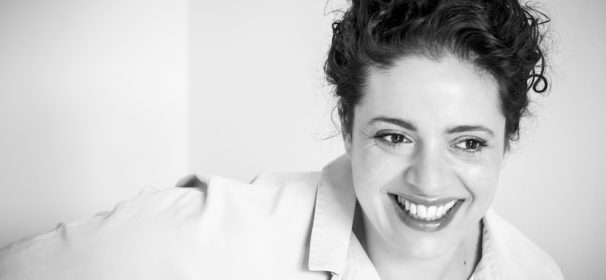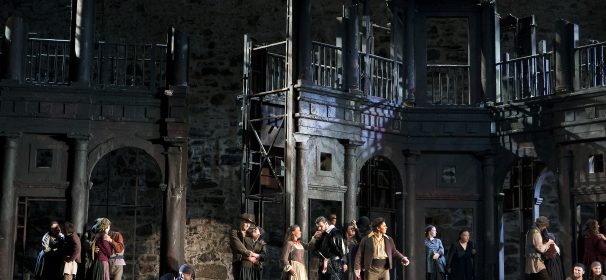Kaija Saariaho’s opera Adriana Mater has been topical ever since it was completed. Set in an unnamed location, the story begins on the brink of a conflict that is about to erupt into war. Although the guns eventually fall silent, the experiences of evil live on in people’s minds. How does one deal with such a situation? In the seed of anger lies the greatest love.
Kaija Saariaho said that Adriana Mater was the most demanding work she had ever composed. Not only because of its length and scale, but also because the subject matter and characters were hard to live with on a daily basis during the three-year composition process. Her last opera, Innocence (2021), likewise posed significant challenges.
Adriana’s story
The central theme of Adriana Mater, which was premiered in Paris in 2006, is the emergence of love and hate within a human being, and how they intertwine in extreme situations such as war or the birth of a child. The opera’s protagonist, Adriana, is a victim of rape. The perpetrator is Tsargo, a man who lives in the same village whom Adriana has tried to resist many times. With the confidence that comes with a military uniform and a gun, however, Tsargo manages to break into the girl’s home and Adriana becomes pregnant. Despite her sister Refka’s objections, Adriana bears the child and gives birth to a son, whom she names Yonas.
The innocent Adriana raises her son with love, but is tormented by the fear that evil will be passed on, either in the blood from father to son or through the mother’s thoughts. Can a child born of rape be loved? ‘Who is this creature that I carry? Is my child Cain or Abel?’ asks Adriana. At the age of 17, when Yonas discovers his origins, he vows to kill his father. The moment of truth comes when Tsargo returns to the village after the war is over.
Two heartbeats
The most important musical element in the opera is the ‘heart motif’, an idea that was born when Saariaho was expecting her first child and two hearts were thus beating inside her body. She had already used this motif in her opera L’Amour de loin, but in Adriana Mater the percussion’s dotted rhythm is extended and the third scene of Act 1, ‘Deux cœurs’ (Two hearts), is named after it.
The destinies of women who have been raped and the cycle of revenge that war leaves in its wake are visible every day. When Adriana Mater was being composed, the Balkan war was still very fresh in our memories. Today, there are even more recent points of comparison with the events of the opera. Adriana finds solace in darkness: ‘We didn’t take revenge, but we were saved.’
Composer and librettist
Kaija Saariaho and the opera’s librettist, Amin Maalouf, worked together for more than twenty years, starting with the opera L’Amour de loin. Maalouf, who lives in Paris, is originally from Lebanon, from where he and his family were forced to flee in 1976 because of the country’s civil war. Born in 1949, Maalouf started his career as a journalist covering international politics for the newspaper Al-Nahar. In France he continued his career as a writer. He has won several prizes for his work, including the prestigious Prix Goncourt in 1993 for his novel Le rocher de Tanios (The Rock of Tanios). He is also a member of the French Academy.
Kaija Saariaho (1952–2023) is the most internationally renowned Finnish opera composer, although in the mid-1980s she herself believed that she would never compose an opera. Saariaho composed extensively for the human voice. Both the text and the visual aspect were important to her. Colour, tone and harmony became central elements in Saariaho’s compositions after her studies in Freiburg in 1981–82 in the composition class of Brian Ferneyhough and Klaus Huber. The search for new timbres also led to the use of computers, which took her to the IRCAM centre for contemporary music in Paris in 1982. She eventually settled permanently in Paris.
Kaija Saariaho (1952–2023) is the most internationally renowned Finnish opera composer, although in the mid-1980s she herself believed that she would never compose an opera.
Throughout her life Saariaho maintained a close relationship with her native Finland. Her 70th birthday was celebrated with numerous concerts and she was awarded the rare title of Academician of Arts in March 2023. Kaija Saariaho was always ready to defend the role of art and in her acceptance speech for this title she said: ‘In a world where everyone tends to live in their own bubble, there is a danger that whole generations will become isolated unless we constantly open doors through art education and experiences of art.’
Text: Hannele Eklund
Adriana Mater at Olavinlinna Castle on August 2nd and 4th, tickets and information here.



